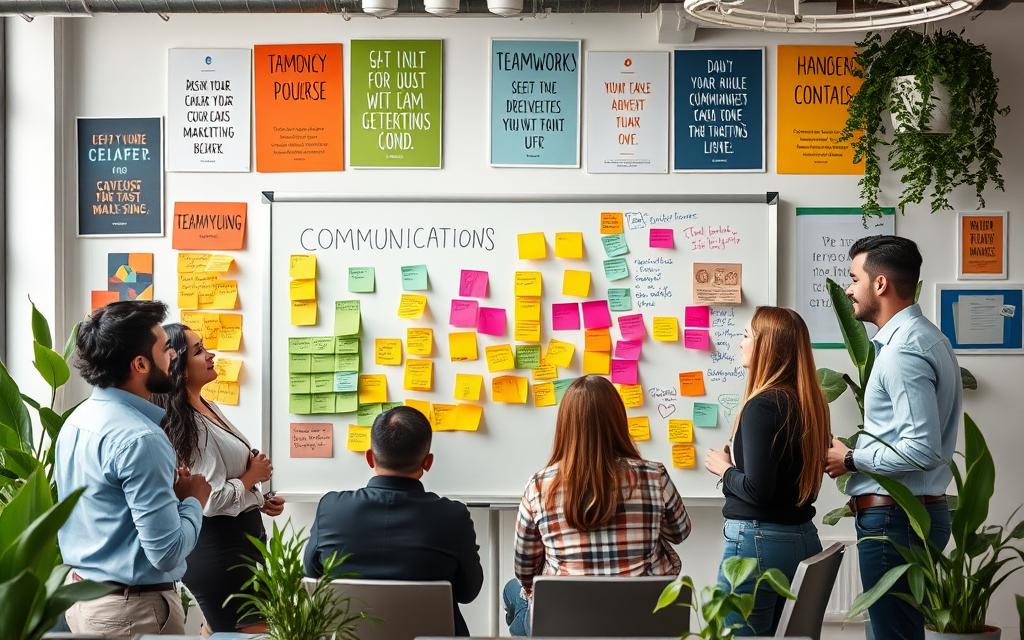Understanding the importance of maintaining high work performance goes hand-in-hand with how you navigate the challenges and opportunities that come your way.
Whether you’re looking to climb the corporate ladder or simply aiming to excel in your current role, it’s crucial to recognize that enhanced work performance not only benefits you but also contributes to organizational success.
By embracing effective strategies and continuously seeking constructive employee feedback, you will empower yourself to achieve more, ultimately propelling your career forward.
Let’s delve into practical ways you can improve your work performance and set the stage for your future.
Also Read: Words That Scare Human Resource
Importance of Work Performance
Understanding the importance of work performance is crucial for both personal and organizational success. High levels of employee engagement contribute significantly to achieving organizational goals.
When individuals feel their performance is valued, it boosts morale and drives productivity. In contrast, a lack of trust can hinder progress.
A statistic reveals that only 48% of employees trust their organizations, indicating a critical gap that must be bridged to enhance overall effectiveness.
Performance reviews play a vital role in this equation. A concerning 74% of employees find the performance review process unhelpful. This highlights the need for a more constructive approach.
Incorporating specific statistics about accomplishments can be impactful, especially when discussing projects that lead to measurable gains.
For example, stating a project resulted in a notable percentage increase in sales reinforces the value of individual contributions.
Team dynamics can suffer if employees compare themselves to others during appraisals. Focusing on personal progress fosters a collaborative spirit rather than creating competition.
Furthermore, the modern workplace presents unique challenges, particularly in remote settings where distractions abound.
Workers can be interrupted every 6 to 12 minutes, impacting focus and productivity. Strategies such as changing scenery or using browser extensions to limit interruptions can enhance concentration.
Creating an organized workspace stands out as essential to maintaining focus. A cluttered environment can detract from one’s ability to perform effectively.
In this context, tracking task completion times becomes a practical approach to better time management. Recognizing patterns in how tasks are completed may help identify triggers for distractions, aiding in a more focused work ethic.
Lastly, examining the tech tools at your disposal is vital.
Many workers could be using redundant applications that complicate communication. Streamlining these tools can prevent unnecessary distractions and enhance overall work performance.
Opting for solutions that simplify processes and automate repetitive tasks reinforces the importance of maximizing efficiency.
In the long run, aligning individual efforts with organizational goals fosters a workplace where employee engagement thrives.
Common Areas for Improvement
In the pursuit of career advancement, you may find yourself identifying specific areas for improvement.
Individuals often focus on enhancing their self-awareness to better understand their strengths and weaknesses.
Key areas for improvement include time management, organizational skills, and communication skills. Mastering these skills can lead to remarkable progress in both personal and professional settings.
Time management is a critical skill that reduces stress and enhances productivity. Employees who effectively prioritize tasks and establish schedules can navigate their workloads with greater ease.
Complementing this is the need for strong organizational skills. By avoiding multitasking and maintaining focus, you can significantly increase your efficiency.
Communication skills remain vital in the workplace. Improving both verbal and written communication fosters a clearer understanding among team members, aiding in conflict resolution and project success.
Cooperation skills also play a crucial role in teamwork. Cultivating an ability to share ideas and resolve conflicts smoothly can propel your career forward.
Other essential aspects include active listening and the ability to give and receive feedback. Developing active listening skills helps ensure accurate understanding and appropriate responses in discussions.
Flexibility, honesty, and straightforwardness are equally important, as they contribute to a healthier work environment.
Lastly, pursuing leadership skills development enables you to inspire and motivate your colleagues, enhancing overall team dynamics.
Ways To Improve Work Performance Answer Examples
Improving work performance involves various strategies that can be implemented in any professional setting.
With a focus on time management, communication techniques, and goal setting, you can take significant steps toward enhancing your productivity and effectiveness at work.
These practical examples will guide you in fostering an environment conducive to work performance improvement.
Time Management Techniques
Effective time management is essential for achieving work performance improvement. Begin by scheduling tasks and setting priorities that align with your objectives.
Use tools like scheduling software to streamline your workload. Realistic deadlines play a crucial role in managing your time effectively.
Employ organized work environments to minimize distractions, allowing you to concentrate on completing tasks efficiently.
Enhancing Communication Skills
Clear and direct communication techniques are vital for improving workplace interactions. Practice active listening to understand colleagues better, fostering empathy and trust within your team.
Continuously refine your written communication skills by creating style guides that ensure consistency.
Awareness of your unique work style can enhance collaboration, positively impacting overall team productivity.
Setting Achievable Goals
Goal setting is pivotal in promoting motivation and progress in the workplace. Establish relevant and achievable goals that encourage professional development.
Create detailed development plans to help you and your team members track growth.
Regular performance reviews can identify areas for improvement, bolstering your path to success through consistent feedback and constructive criticism.
Utilizing Constructive Feedback
Constructive feedback plays a pivotal role in employee growth and organizational health. When providing a performance review, it’s vital to start with positive observations.
This approach helps establish a supportive atmosphere and encourages openness. Following this, identify specific areas of improvement using concrete examples.
For instance, if an employee struggles with time management, relay instances where deadlines were missed and provide suggestions on how to prioritize tasks effectively.
The method minimizes defensiveness and promotes a growth mindset.
Timely feedback is essential for relevance and impact. Employees are more likely to absorb and act on comments when they’re provided soon after events occur.
Reframing criticism into actionable feedback is beneficial in shaping a constructive dialogue. Many individuals find feedback conversations to be anxiety-inducing.
Acknowledge these feelings and offer encouragement to alleviate tension. Highlighting accomplishments alongside areas for improvement fosters a balanced perspective, making it easier for employees to embrace change.
Positive feedback reinforces desired behaviors, further encouraging employees to strive for excellence.
Real-time feedback allows for immediate correction of mistakes, paving the way for better performance in the future.
Constructive feedback encompasses not only constructive criticism but also coaching skills that help guide employees toward success.
Feedback culture within an organization thrives when team members value and actively seek constructive feedback.
By addressing common issues such as poor communication skills or toxic behaviors with specific examples, employees gain insight into their performance.
This shared understanding catalyzes employee growth, enabling individuals to evolve into new skills and roles that add significant business value while contributing to a more harmonious workplace.
Developing Leadership Skills
Leadership is essential for effective team management and personal growth within the workplace.
For individuals aspiring to managerial roles, the development of strong leadership skills proves invaluable.
Recognizing opportunities to assert leadership can significantly impact both personal advancement and team dynamics.
Recognizing Leadership Opportunities
Identifying opportunities to lead ensures a commitment to leadership skills development.
Engaging in projects that require initiative can showcase your readiness for managerial roles and allow you to volunteer for tasks that others might shy away from.
By stepping up, you demonstrate not only your capability but also a willingness to guide and mentor peers.
Most leaders believe setting measurable goals boosts team performance. Therefore, setting clear objectives can be an initial step toward taking on more responsibilities.
Moreover, learning to manage challenges can enhance your leadership profile. Many project leaders acknowledge encountering missed deadlines, yet most of them manage to turn these setbacks into success stories.
This resilience highlights the benefits of recognizing growth opportunities amid adversity.
Leaders should leverage their personal interests and motivations, as about half of all align their techniques with individual team members’ passions, fostering an environment of engagement and productivity.
Effective communication also plays a critical role in leadership. Leaders emphasize the necessity of open dialogue when navigating change, with most identifying it as a primary strategy.
Establishing a culture of transparent communication not only aids conflict resolution but also helps create an atmosphere where team members feel valued.
This approach aligns with the fact that a third of all employees feel poor communication negatively impacts morale. Consequently, enhancing your communication skills becomes a pivotal component of leadership development.
By actively seeking out opportunities and fostering essential skills, you position yourself effectively for future managerial roles.
Each step taken enhances your leadership capabilities, ultimately contributing to a more dynamic and collaborative work environment.
Encouraging Team Collaboration
Team collaboration plays a crucial role in the success of any organization. By encouraging a culture of collaboration, you can help build effective teams that thrive in various work environments.
Strategies that promote teamwork, clear communication, and mutual respect lead to a more engaged workforce and foster a positive atmosphere.
Building Effective Teams
To create effective teams, it is essential to establish clear goals and facilitate open dialogues among team members.
Implementing communication tools allows remote teams to maintain strong connections, ultimately improving their efficiency.
When employees feel valued and appreciated, it significantly enhances their wellness and engagement, resulting in lower absenteeism and higher job satisfaction.
An inclusive team environment encourages everyone to share ideas and participate actively in discussions, leading to better outcomes.
Fostering a Positive Work Environment
A collaborative work environment can contribute to a positive atmosphere where colleagues build social connections and work harmoniously.
Removing vertical hierarchy barriers promotes a culture where all employees can voice their opinions and contribute positively.
This dynamic not only enhances productivity but also increases employee morale.
Organizations with strong collaboration practices enjoy higher retention rates and lower turnover, as employees are less likely to leave when they feel heard and included.
Continuous Learning & Professional Development
In today’s fast-paced work environment, continuous learning stands out as a vital component of professional development.
Employees increasingly prioritize opportunities for employee training when evaluating new job prospects, with many of them indicating that such options sway their decisions significantly.
Investing in ongoing education not only helps individuals keep their skills up to date but also benefits organizations by reducing turnover rates.
Workers are more inclined to remain with firms that actively promote their learning and development. The importance of creating a culture that supports continuous learning cannot be overstated.
Employees are more likely to stay with organizations that provide ongoing training, emphasizing the need for companies to develop and implement robust training programs.
Deloitte’s Continuous Learning Model categorizes learners’ needs into Immediate, Intermediate, and Transitional, offering frameworks for various learning styles, including Education, Experience, Exposure, and Environment.
This structured approach enables organizations to cater to diverse employee development requirements effectively.
To build an effective continuous learning strategy, it is essential for organizations to set long-term goals and develop a supportive learning environment.
This includes integrating Learning Management Systems (LMS) to facilitate cohort and virtual learning, providing flexibility to accommodate busy work schedules.
As skill gaps continue to threaten many companies—most report concerns in this area—continuous learning becomes a crucial factor in remaining competitive and responsive to market changes.
Strategies for Self-Reflection
Self-reflection is essential for personal growth and enhancing work performance. It enables you to evaluate your strengths, identify areas for improvement, and develop strategies for effective performance evaluation.
One effective strategy is maintaining a reflective journal. This practice encourages you to document your daily experiences, thoughts, and feelings, allowing you to gain insights into your actions and decisions over time.
Another valuable approach is seeking feedback from peers. Engaging colleagues for their insights on your performance fosters an open dialogue that can reveal hidden strengths and weaknesses.
The collaborative feedback can contribute significantly to your self-reflection process, promoting personal growth.
Setting personal benchmarks for progress offers a structured way to assess your development over time.
By establishing clear objectives, you can track your performance against these goals, allowing for targeted self-reflection. This helps in identifying specific areas where you can enhance your skills or knowledge effectively.
The ultimate goal of self-reflection is to cultivate a mindset focused on continuous improvement. This proactive approach not only boosts personal growth but also enhances overall performance evaluation.
Regular self-assessment can improve your commitment to achieving professional objectives and building a stronger, more trusting relationship with your organization.
Creating a Personal Improvement Plan
A personal improvement plan serves as a crucial roadmap for your professional development. It identifies specific areas for improvement while integrating measurable goals and timelines.
Effective goal setting is fundamental in this context. Clear objectives enable you to align your aspirations with organizational expectations, facilitating the overall framework of your development strategy.
To create an effective personal improvement plan, first assess your current performance level. Identify key areas, such as time management or communication skills, where you can focus your efforts.
Each goal must be attainable, ensuring that you have a realistic pathway towards improvement. Regular check-ins with your progress are essential, providing opportunities for feedback and adjustments to your plan as necessary.
Incorporating industry-specific best practices can significantly enhance your personal improvement plan.
For example, if your objectives involve enhancing leadership skills, explore training sessions or mentorship programs.
Such initiatives not only target personal growth but also augment the overall team dynamics, leading to improved efficiency and alignment with the company’s vision.
Ultimately, a well-structured personal improvement plan promotes accountability and clarity.
By actively engaging in the process and setting measurable milestones, you can navigate through challenges effectively and contribute positively to your professional environment.
Conclusion
Actively striving to improve work performance is essential for both personal growth and the overall success of an organization.
By honing your self-awareness and embracing constructive feedback, you are laying the groundwork for meaningful employee development.
Focusing on areas such as communication skills and effective time management empowers you to adopt success strategies that not only enhance your role but also contribute to a more productive workplace environment.
Engaging in continuous learning, exploring mentoring opportunities, and developing your leadership potential are pivotal steps in this journey.
Performance reviews, despite the challenges some employees may face, serve as valuable tools for identifying both strengths and weaknesses.
They unlock the keys to improvement and can result in significant advancements in your professional capabilities, ensuring a positive trajectory for career success.
Ultimately, committing to a personal improvement plan that incorporates ongoing self-reflection and accountability will yield tremendous benefits.
By cultivating these qualities, you empower yourself to navigate challenges effectively, enhance collaboration with your teammates, and elevate your performance in every aspect of your work life.















